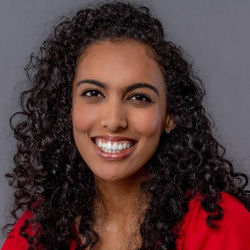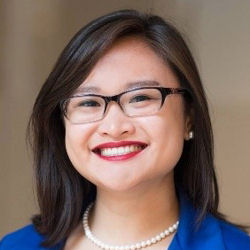
Rachana Raghupathy
— MEDICAL SCHOOL —
Northeast Ohio Medical University
— GRADUATING CLASS —
2022

Michelle Tan
ACP Georgia Student Council Chair
ACP Council of Student Members and Volunteerism Committee
— MEDICAL SCHOOL —
Emory University School of Mediciney
— GRADUATING CLASS —
2022
Adjusting to clerkships is already difficult, but doing so during the COVID-19 pandemic—amidst the uncertainty and disruption that have come to be hallmarks of our experiences—has been a unique and extraordinary challenge. As medical students, most of us have not been allowed to see COVID-19–positive patients or persons under investigation, and restrictions quickly escalated to include any patient with a respiratory complaint. I remember my first day stepping into the ICU during the peak of COVID-19: As I took my tour of the area, I saw countless beds occupied by COVID-19 patients, prone and on ventilators. It was an indescribably unsettling feeling to know there was absolutely nothing I could do. Many may argue that the role of a medical student in an intensive care unit is minimal to begin with, but knowing I could not even enter the patient room and offer a hand to hold or a fresh, warm blanket established a whole new level of distance from direct patient care.
Third-year medical students were allowed back into clinical environments on a contingency, and in my mind, rightfully so. If cases were to rise to the point of exacerbating the already existing PPE shortages, there was an understanding that we students would step back in order to limit our exposure and prioritize PPE for nurses, physicians, and specialists who had the expertise to help patients in a more substantial way. Of course, we all could not help but wonder what that would mean for our clinical education. As I clicked through my online modules meant to simulate cases, I worried about how reading about a COPD exacerbation could possibly replace witnessing management in real time. I worried about how prepared I would be when it was my turn to manage these diseases myself. I worried about how all this could affect the quality of physician I would become.
In addition, even when we were able to enter clinical settings, censuses were low and opportunities for exposure limited. Not to mention that the pandemic added significant stress to the already substantial workload on residents and attendings. This, in turn, hindered many mentors from devoting valuable time, energy, and resources to teaching medical students to the same degree as they had previously. On the other hand, many students felt anxious that a certain lack of opportunities for clinical exposure would impact our ability to explore potential fields of interest. For instance, my internal medicine and surgery clerkships were cut down from 8 to 6 weeks, and at least one of my clerkships transitioned to being entirely virtual. Not only did I have less time to network with potential mentors to assist with M4 year scheduling and letters of recommendation, I also had less time to study for shelf exams and practice my clinical skills and knowledge.
The whole situation has been undoubtedly overwhelming. When things start to feel particularly tough, it's especially important to revisit strategies to help alleviate your stress. Here are some approaches I found helpful during this difficult time:
- Take care of your body: Aside from COVID-19 prevention practices, such as social distancing and proper hygiene, make sure you prioritize your body through exercise, sleep, and healthy eating. If doing so daily is not feasible with your busy school schedule, set weekly or monthly goals for yourself.
- Take care of your mind: Those who may not have established their own meditation or relaxation practice can follow guided courses via various apps (such as Headspace or Calm) or courses available online.
- Spend time outside: Between clerkship schedules and studying, it can be extremely hard to find time for much else. However, when you have the chance, go on a walk or run outside or get a change in scenery.
- Find ways to connect with friends and family: Social distancing does not have to mean social isolation! Keep in touch with your loved ones, and try to spend time with them virtually to maintain a sense of contact and closeness.
- Ask for help if you need it: Get in touch with trained individuals through counseling services, reach out to loved ones and mentors, and check in with your academic faculty if you need support emotionally or academically.
- Find other ways to impact patient care: There are so many ways to affect change within our health care system, and ACP is a great avenue through which you can do it! Take a look at our February IMpact CSM Spotlight for more information on prior initiatives and ways to get involved.
- Take time to reflect: It is easy to get bogged down by all the loss, grief, and disruption that COVID has inflicted on our lives. However, remember to take some time to reflect on yourself, your values, and your ambitions, as well as all the good this year has brought.
As health care systems across the country begin administering vaccines to frontline workers, a renewed sense of hope begins to settle in as we adjust to the “new normal.” This year bore hardship and struggle. Yet, for many, it also brought us closer to our loved ones and reminded us why we wanted to enter this profession in the first place: to be present, listen, and heal. When the anxiety about our preparedness as future physicians sets in, we must remember the kind of people we have grown to be. We as medical students have proven resilient against change and adversity. We have braved the uncertainty and adapted to the evolution of medical education. Regardless of what is to come, this newfound fortitude is what we will undoubtedly carry forward with us.
Back to the April 2021 issue of ACP IMpact

